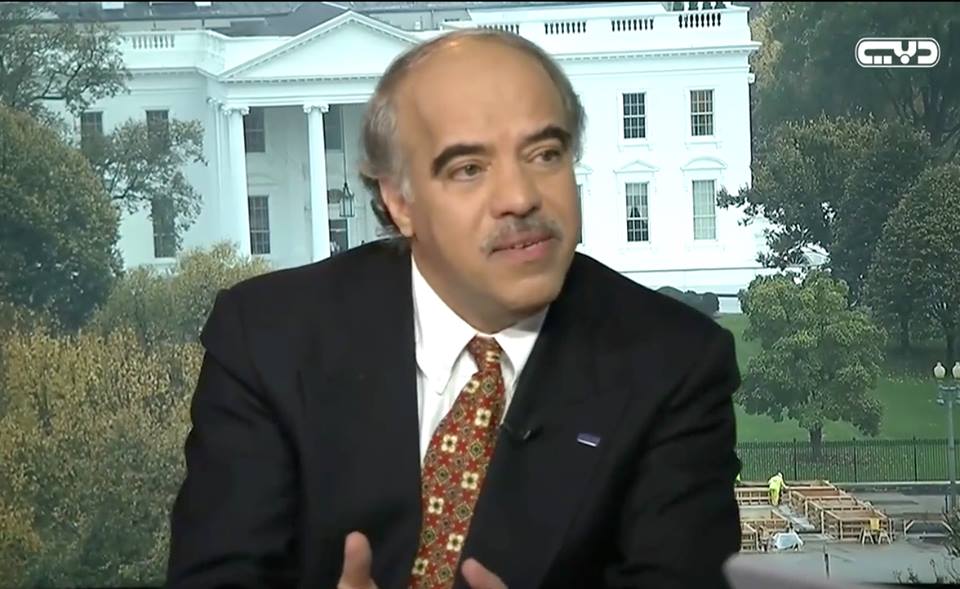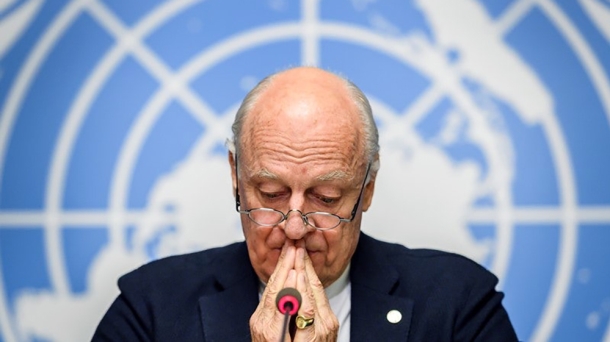
The Syrian conflict has highlighted an ironic asymmetry of diplomatic approaches proposed in various talks in Geneva, Vienna, Riyadh, Istanbul, Astana, and recently Sochi. After seven years of bloodshed and interference of several international and regional stakeholders in Syria’s civil war, the country has imploded into areas of territorial control of Americans, Russians, Iranians, Turks, as well as various militias with distant loyalties. The Russian-backed Syrian military campaign continues to target the so-called “armed” or “terrorist” neighborhoods in Eastern Ghouta, the latest battlefield after Aleppo, Adlib and others. The rebels have shown no willingness to give up the fight. Israel is threatening to ramp up its military strikes to counter the growing Iranian presence.(1) Lebanese Hezbollah leader Hassan Nasrallah said Israeli strikes on his positions in Syria did not, and will not, prevent supplies of weapons reaching the group.(2) As for the Trump administration, Syria remains a source of “severe strategic threats and a major challenge for our diplomacy,” as then-U.S. Secretary of State Rex Tillerson stated at Stanford University back in January 2018.(3) Consequently, the 114-state member of the coalition “Friends of Syria”, which emerged in the backdrop Russia’s second veto in favor of Assad at the Security Council in February 2012, has waned significantly since 2016. It has lost its momentum in arguing that Assad had “lost legitimacy and should stand aside to allow the launching of a sustainable political transition process in conformity with the Geneva communiqué”.(4) Turkey and Iran, who did not see eye to eye on the legitimacy of Assad in 2012, have come closer within the emerging pact with Putin’s Russia with summits held in Sochi, Astana, and another expected in Istanbul in April 2018. In short, fierce battles are on the rise with no tangible progress toward an end of violence or a promising political settlement. As a young female Syrian activist said, “everyone is awaiting a solution; even those who bear weapons.”(5)
This paper explores three main questions that have kept the future of Syria at limbo: a) Does the Kremlin aim at forging a promising peace initiative or just affirming a de-facto reality after the announcement of its military withdrawal from Syria in 2017? b) Whether the Putin-Lavrov-brokered Sochi meeting between the Syrian government delegation and a few opposition groups in January 2018 has reinforced or undermined the United-Nations-mediated Geneva process initiated in June 2012 under then-UN envoy Lakhdar Brahimi. So far, Russia has militarized the conflict in favor of the Assad regime, and has not made tangible strides in securing peace, neither in stimulating minimally a kind of détente between Assad and his detractors. c) How the current dynamics of the Syrian conflict will push its trajectory into another protracted conflict in a turbulent region?
Piecemeal Humanitarian Diplomacy for Syria
Unlike the grandiose promise of the first round of Geneva talks June 30, 2012, the Security Council has increasingly shrunk its maneuvering of the seven-year-long Syrian crisis with a short-term truce in Syria this time. On February 24, 2018, it adopted a Kuwait-and-Sweden-proposed resolution that called for a thirty-day ceasefire, and demanded immediate lifting of sieges on war-ravaged enclaves like eastern Ghouta. United Nations Secretary-General António Guterres expressed his concern that some 400,000 people were living “in hell on earth.”(6) The British-based Syrian Observatory for Human Rights affirmed that more than 500 individuals were killed in one week under the intensifying strikes against the rebel-held areas in Eastern Ghouta. According to UNICEF, the number of 360 injured children in 2017 has tripled to 1,000 children reportedly killed or injured in the first two months only of 2018 under the use of explosive weapons and indiscriminate attacks in densely populated areas. As the world organization points out, "these are only the numbers that the United Nations was able to verify, and actual numbers are likely to be much higher."(7)
The adoption of the new resolution had been stalled for several days by Russian ambassador Vasily Nebenzya who deemed an earlier version as “non-feasible”. He contested what he considered “unrealistic approach”, which would do nothing to address the issue, and urged the United States to focus on fighting terrorism instead of “scaling up rhetoric against Russia.”(8) There was evident resentment of the Russian position among other permanent members of the Security Council. The United Kingdom representative Stephen Hickey argued, “While we have been arguing over commas, Assad’s planes have been killing more civilians in their homes and in their hospitals imposing unbearable suffering.”(9)
The new resolution highlights how the threats to civilians remain significant with worsening shortage of medical supplies. It also underscores the need for urgent humanitarian aid, including medical assistance, for more than 13.1 million people in Syria, of whom 6.1 million are internally displaced, 2.5 million are living in hard-to-reach areas, including Palestinian refugees, and hundreds of thousands of civilians are trapped in besieged areas.”(10) Sweden’s ambassador to the United Nations Olof Stoog highlighted the fact that the new resolution is “not a comprehensive peace deal on Syria, its aim is purely humanitarian”, and affirmed the UN convoys and evacuation teams were ready to go.(11)
However, this humanitarian initiative in New York does not adequately address the grave civilian devastation across Syria, let alone the struggling diplomatic approach toward the complex conflict and multi-crossfire lines in the country. To adopt the deductive reasoning of one local media activist, another nightmarish scenario is looming in the horizon; “it’s like the end of humanity, it is like hell on earth. If they agree on one month in eastern Ghouta, after that one month, what? Will they return and target the town and kill more people?”(12)
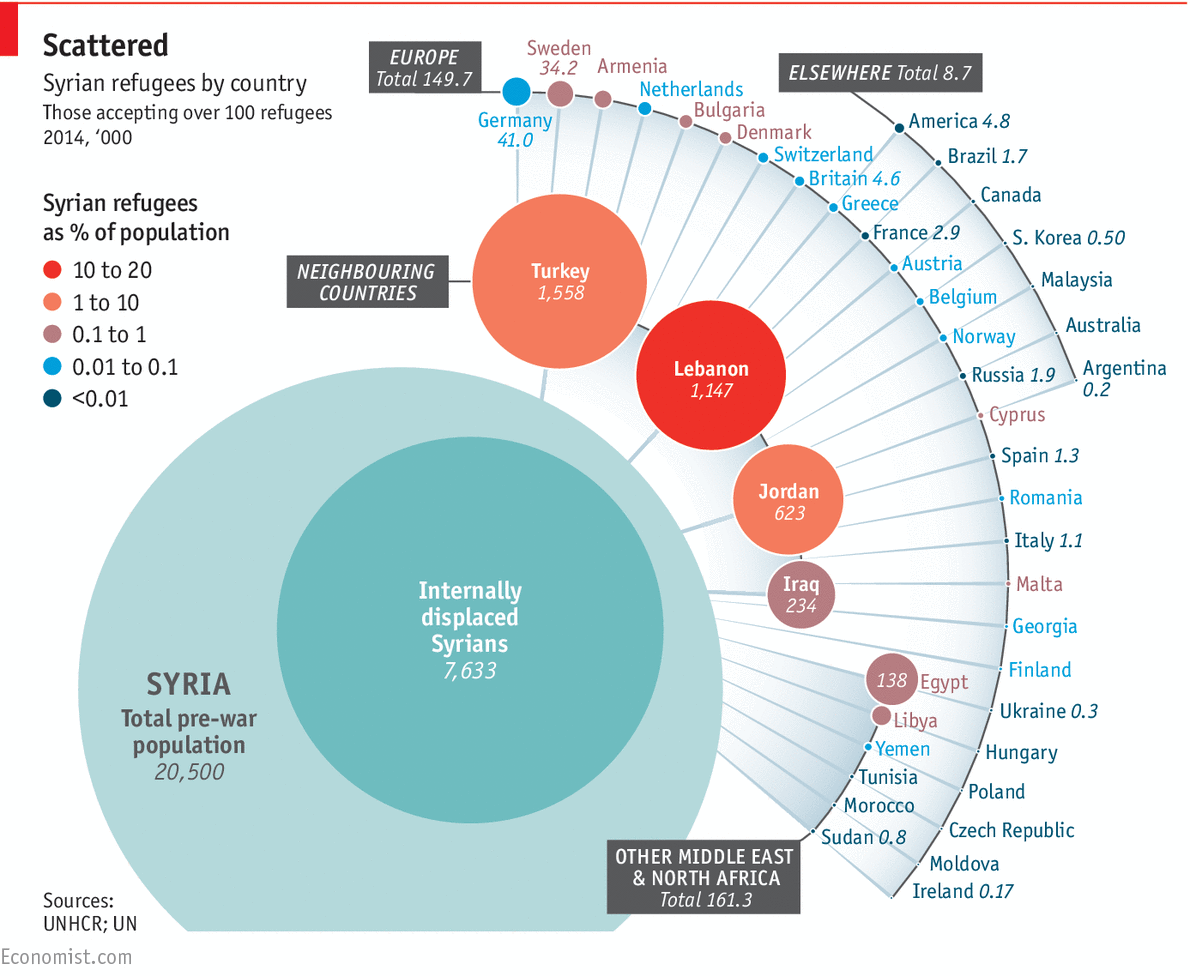 |
| [UNHCR] |
These kinds of concerns are not unusual in an open-ended battle for survival for the Syrian regime, which has vowed to defend its territory and continue to “fight terrorism, wherever it is”.(13) However, French ambassador François Delattre vowed to hold regional powers with forces in Syria – Russia, Iran and Turkey – to account in upholding the ceasefire. He implied a waning moralistic call, “our generation will be judged on whether or not we manage to put an end to the Syrian tragedy.”
In its 2018 Syria Needs Overview report, the United Nations Office for the Coordination for Humanitarian Affairs (OCHA) asserts that hostilities still fuel large-scale displacement in Syria at an average rate of 6,550 displaced each day. Some 13.1 million people in Syria require humanitarian assistance, including 5.6 million people who are in acute need, due to a convergence of vulnerabilities resulting from displacement, exposure to hostilities, and limited access to basic goods and services.(14)
As I wrote in my recent book “What is Enlightenment: Continuity or Rupture in the Wake of the Arab Uprisings”, the depiction of the worsening conflict in Syria, seven years after the first non-violent protest in Deraa March 15, 2011, “implies a four-fold failure: political, humanitarian, moral, and civilizational in the new century.”(15) After years of the UN diplomacy coordinated by three world-class diplomats: Kofi Anan (February 2012–August 2012), Lakhdar Brahimi (September 2012–May 2014), and Staffan de Mistura (July 2014– present), the international community including “Friends of Syria” have struggled with reaching any sustainable ceasefire agreements or initiating constructive rapprochement between the Syrian government and various opposition groups. As an Arab strategist wrote, “This is a big problem. It is something that no state wants to talk about. They cannot acknowledge that they cannot find solutions by themselves. But it is very much an issue that the region is concerned about.”(16) This challenge has opened the door for international interventions as far as Moscow.
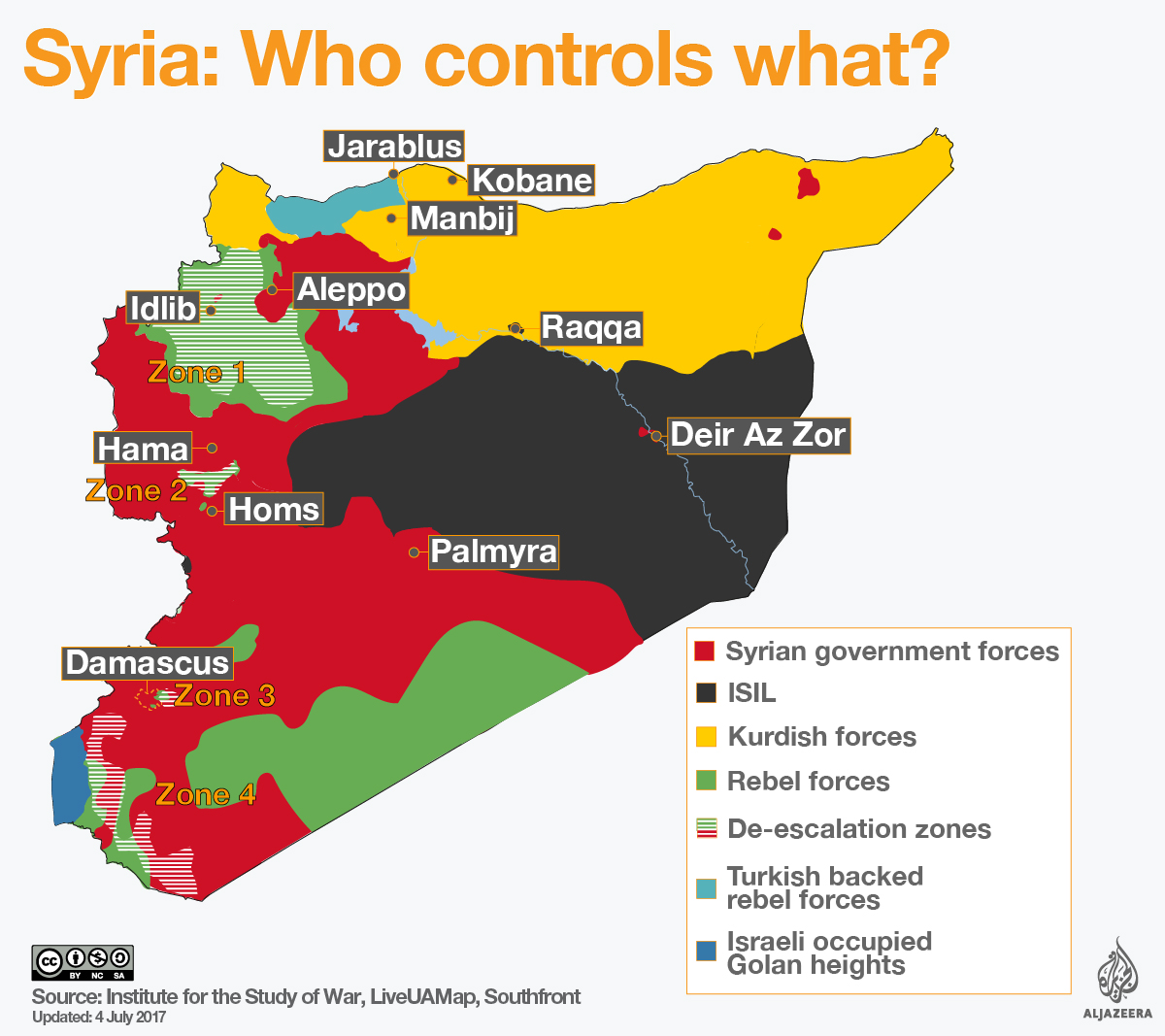 |
| [AlJazeera] |
The New Magnet of Russian Strategy
Now, Syria’s ravaging civil war represents a window of strategic opportunism for Russia, which has secured a political escrow since 2015 with the aim of stimulating a new balance of power in eastern Mediterranean at the intersection of its strategic interests with the Iranians and the Turks. Unlike the classical American-Soviet dyadic rivalry in the region during the Cold War era, the new international linkages to the Syrian conflict have embraced the strategy of installing an alternative power system of global-regional alliances. Conflict theorist Edward Azar perceives those international linkages as the "political–economic relations of economic dependency within the international economic system, and the network of political-military linkages constituting regional and global patterns of clientage and cross-border interest."(17) The emerging geo-political shift in the region showcases the formulation of a ‘neo-Warsaw pact’ shaped by Russia, Iran, and Turkey versus the ‘Club of Powerful Men’ that includes Trump’s America, Mohamed Bin Zayed’s UAE, Mohamed Bin Salman’s Saudi Arabia, Sisi’s Egypt, and Netanyahu’s Israel.
Both pacts have sought to recruit other countries like Jordan, Egypt, Sudan, Somalia, and others. Some interesting revelations have surfaced recently about a secret “Yacht Summit” held in the Red Sea, in late 2015. Lebanese-American businessman George Nader proposed to bin Salman, bin Zayed, Sisi, Salman crown prince of Bahrain, and King Abdullah of Jordan to set up “an elite regional group of six countries, which would supplant both the Gulf Cooperation Council (GCC) and the moribund Arab League.”(18) According to some sources, King Abdullah flew to Washington, a few months later, to brief Congressional leaders that “Turkey presented the main threat to regional security.”(19)
These global-regional regroupings indicate some cooperative determinism in forging a new balance of power in the Middle East. However, Harvard scholar Stephen Walt leans more toward a ‘balance of threat theory’. As he argues, “when facing a powerful or threatening state, a worried country can mobilize more of its own resources or seek an alliance with other states that face the same danger, in order to shift the balance more in its favor.” He also highlights one significant dynamic typical of regional politics in Syria, Iraq, Yemen, Lebanon, and Libya; “if you forget about balance of power politics, you’re likely to be surprised when other states (or in some cases, non-state actors) join forces against you.”(20) The combined roles of certain state and non-state actors, like Hezbollah, have gradually tilted toward the Russia-led alliance, whereas the rival US-led pact has undergone some limitations because of the tunnel vision of eradicating ISIS as the main priority of Trump’s policy. Secretary Tillerson was clear in his assessment “the United States recognizes and honors the great sacrifices the Syrian Democratic Forces have made in liberating Syrians from ISIS, but its victories on the battlefield do not solve the challenge of local governance and representation for people of eastern and northern Syria.”(21)
Ironically, The Kremlin has benefited from Trump’s advocacy of political isolationism within the two objectives of his allegedly ‘pragmatic’ foreign policy: combating ISIS and downsizing Iran’s nuclear ambition and influence across the region. President Trump was blunt in stating the United States had no intention to intervene in the region; “We are there for one reason. We are there to get rid of ISIS and go home. We are not there for any other reason, and we’ve largely accomplished our goal.”(22) Paradoxically, Russia has played its card well in the simple exercise of realpolitik with little concern about what many critics would call the morality of its actions.(23) However, Israel’s fear of turning Syria into an Iranian base has triggered growing concern over the risks of an Israeli-Iranian war on the Syrian territory. International Crisis Group maintains that Russia appears to be “the sole actor capable of mediating understandings to prevent an Iran-Israel escalation across the country.”(24) Effectively, Russia will become a de-facto manager of various stabilizing strategies, and will have more advantage than the United States in pushing for or avoiding a regional war.
Putin’s Strategy in Syria: Military Pull Out or Strategic Pull In?
After Russia’s involvement in Syria in 2015, President Putin decided to ‘end’ the military operation inside Syria, and the stage was set for a switch to politics for the “long-term regulation of Syria”.(25) He foresaw the possibility of an endgame of Syria’s chaos and a favorable opportunity for his strategy in the region. He also claimed Assad was “ready to work with everyone wanting peace.”(26) This could be an understatement about the efficacy of the Kremlin’s strategy in suppressing not only the argument about the mass killings and civilian devastation inside Syria, but also in shaping a tactful discourse of counterterrorism against ISIL while targeting opposition factions in Syria. Putin’s Syria policy has succeeded in assuring Trump with Russia’s contribution to the imperative of eradicating the so-called ‘radical Islamic terrorists’. However, there is widespread conviction Russia certainly has a whip hand over the developing peace process, but its goals remain opaque.(27)
By late 2017, the Kremlin solidified Russia’s influence in the Mediterranean Basin. Based on a deal reached with the Syrian government and later adopted by the Russian parliament, Putin signed a new law, in July 2017, to deploy Russian forces at the Hmeymim base in Latakia Province for 49 years with the option of extending that arrangement for 25-year periods. The Hmeymim base has been instrumental in launching attacks against forces opposing President Bashar al-Assad.(28) The Hmeymim air base complements the strategic value of the Tartus naval base that has handled Russia’s largest nuclear-powered ships since the 1970s. The then-bilateral agreement between Damascus and Moscow recognized the right of Russia “to bring in and out any kind of ‘weaponry, ammunition, devices and materials’ to provide security for the facility staff, crew, and their families throughout the territory of the Syrian Arab Republic ‘without any duties or levies.’”(29) Subsequently, this military-counterterrorism paradigm has turned into a blanket statement of the use of power politics. Putin told Assad during their Sochi meeting November 21 “mission nearly accomplished… We’re still a long way off fully defeating terrorism.”(30)
The same paradigm of managing the brutality of the conflict has led to some fixation on legitimizing the use of lethal force against ‘terrorists’, and overshadowed the plight of half of the Syrian population and other humanitarian chaos bypassing the voices of moral politics. According to a Kremlin transcript, Putin told Assad “the most important question, of course, is what will happen after the defeat of the terrorists in terms of a peaceful political settlement.”(31)
Is There a U.S. Syria Policy?
Former president Barak Obama's approach towards the Syrian crisis still triggers a controversy on what he would, could, should have done at different intervals of the bloodshed, humanitarian devastation, and diplomatic struggle in his second term at the White House [2013-2017]. His refusal of engaging U.S. soldiers on the ground in Syria and Iraq and his reluctance to equip the Syrian opposition factions implied a double dilemma. By adopting one approach or its opposite, he still provokes a lot of criticism inside and outside of the United States. Josh Landis a veteran analyst of Syria believed “there is no way that the United States was going to solve the Syria Problem in any constructive way – and just keeping us out of it to the extent he [Obama] did was a boon.”(32)
Consequently, the Kerry-Lavrov frequent diplomatic talks were pivoting around limited ceasefires. The U.S. political void triggered the conviction that "there is no military solution", which became the mantra in briefing rooms at the White House and State Department.(33) Vali Nasr of Johns Hopkins University and author of “The Dispensable Nation: American Foreign Policy in Retreat” argues that Obama’s Syria policy undermined America's leadership role in the world. He asserts "Syria exploded in strategic ways. It empowered Russia and Iran, produced ISIS, strengthened al-Qaeda and created the refugee crisis which became a strategic threat to Europe."(34)
With Trump in office, the U.S. Syria policy drifted into a campaign against ISIS as the battlefield of counterterrorism. Tillerson recalls how President Trump formulated his Syria policy, “by directing Secretary of Defense Mattis to present within 30 days a new plan for defeating ISIS. Today, nearly all territory in Iraq and Syria once controlled by ISIS, or approximately 98 percent of all of that once United Kingdom-sized territory has been liberated, and ISIS has not been able to regain one foot of that ground.”(35)
The security/counterterrorism paradigm remains dominant in the Trump administration’s approach toward Syria, while embracing the UN mediation efforts as a formal diplomatic framework. One can summarize the current U.S. strategy in Syria in what Tillerson termed as “five key end states”:
1. ISIS and al-Qaida in Syria suffer an enduring defeat, do not present a threat to the homeland, and do not resurface in a new form; that Syria never again serves as a platform or safe haven for terrorists to organize, recruit, finance, train and carry out attacks on American citizens at home or abroad or against our allies.
2. The underlying conflict between the Syrian people and the Assad regime is resolved through a UN-led political process prescribed in UN Security Council Resolution 2254, and a stable, unified, independent Syria, under post-Assad leadership, is functioning as a state.
3. Iranian influence in Syria is diminished, their dreams of a northern arch are denied, and Syria’s neighbors are secure from all threats emanating from Syria.
4. Conditions are created so that the refugees and IDPs can begin to safely and voluntarily return to Syria.
5. Syria is free of weapons of mass destruction.(36)
Syria Diplomacy Going East
When the first round of the Syrian talks was held in Geneva June 30, 2012, the then-UN seasoned envoy Lakhdar Brahimi raised high expectations of possible containment of violence and formulation of a political plan to help enable Syrians independently and democratically determine their own future. There was clear determination among the United Nations, the European Union, the Arab League, United States, Russia, China, France, United Kingdom, Turkey and other members of the Action Group for Syria, to “work urgently and intensively to bring about an end to the violence and human rights abuses and the launch of a Syrian-led political process.”(37)
Brahimi took into consideration that that “Iran, the most influential force behind Assad, was, if part of the problem, also essential to negotiating the solution.”(38) His well-informed calculation of Iran’s power proved to be a valid variable throughout the Geneva process, before it became publically evident in the Putin-Rouhani-Erdogan pact and subsequent testing of their Syria strategy. The maneuvering of a future ‘Assad-stay’ Syria has been pivotal, from on the onset, in shaping the Russian diplomacy of Astana and Sochi. In January 2018, Moscow gathered 1,511 delegates representing various ethnic strata of Syrian society, and produced a 12-point framework of the political transition in Syria. Vasily Nebenzya, the Russian ambassador to the United Nations, argued the Sochi meeting was “in the interests of the United Nations to participate since Sochi is not an isolated event, and should contribute to the UN-sponsored process.”(39) The Sochi Congress has emerged as a shadow move of the Geneva process and provided what was celebrated a ‘breakthrough’ by holding direct interaction between the Syrian government delegation and the opposition attendees.
The Kremlin managed to secure the presence of less radical opposition groups, along the Syrian government delegation, whereas other UN-recognized negotiating opposition groups, known as “Minassat” (platforms), boycotted the symbolically-crafted ‘Peace to the Syrian People’ conference at the end of January. Russian president Vladimir Putin heralded the trajectory of the conference; and made his presumptuous speech, “Today all the conditions are in place to turn this tragic page in Syria’s history.”(40) Paradoxically, UN Special Envoy Staffan de Mistura was just another guest to witness the ceremonial Russian day for Syria’s peace. One of the ironies of this Geneva-Sochi shift of international diplomacy is how the United Nations ended up asking for assurances that “Russia recognizes the UN is still responsible for drafting a constitution and the mediation process”!(41)
In New York, UN Secretary-General hoped the gathering in Sochi would be “an important contribution to a revived intra-Syrian talks process under the auspices of the United Nations in Geneva.”(42) De Mistura considered it a shift from theory to practice; “We never had the government side and the opposition actually getting involved in a discussion of a new constitution, because they were not in agreement. I think we have reached that point.”(43) He clarified the issue of presidency was not discussed; “We have been discussing the 12 points/principles and you will see they are of a broad nature but they have an impact on everything in the future constitution; and we have started addressing the issue about how to proceed on a new constitution. So that issue has not even come up.”(44)
Some observers have pointed out that “Putin is trying to do with the Congress idea is bridge the gap between the Astana talks, which are about ceasefires and technical matters, and the much-stalled Geneva talks, which are about a grand political settlement."(45) "This congress would sit in the middle, but it suggests that Putin is trying to shape the future of Constitution of Syria ahead of any future Geneva talks."(46) other analysts including Andrew Parasiliti, director of global policy at RAND Corporation, point out that the Russians wanted “a deal on Assad’s terms. That is a bitter pill for many in the opposition to swallow, and that is why you are seeing the SNC boycotting the summit. Sochi makes clear, if it wasn’t already, that the road to a political solution in Syria goes through Tehran, Ankara, and Moscow.”(47) Some former insiders in the Kremlin underscore the dubious agenda behind the Sochi Congress. Vladimir Frolov former Kremlin advisor points out “This was an attempt to frame a settlement between Assad and the puppet opposition. Assad is not interested in a genuine political process, only in the opposition’s capitulation.”(48)
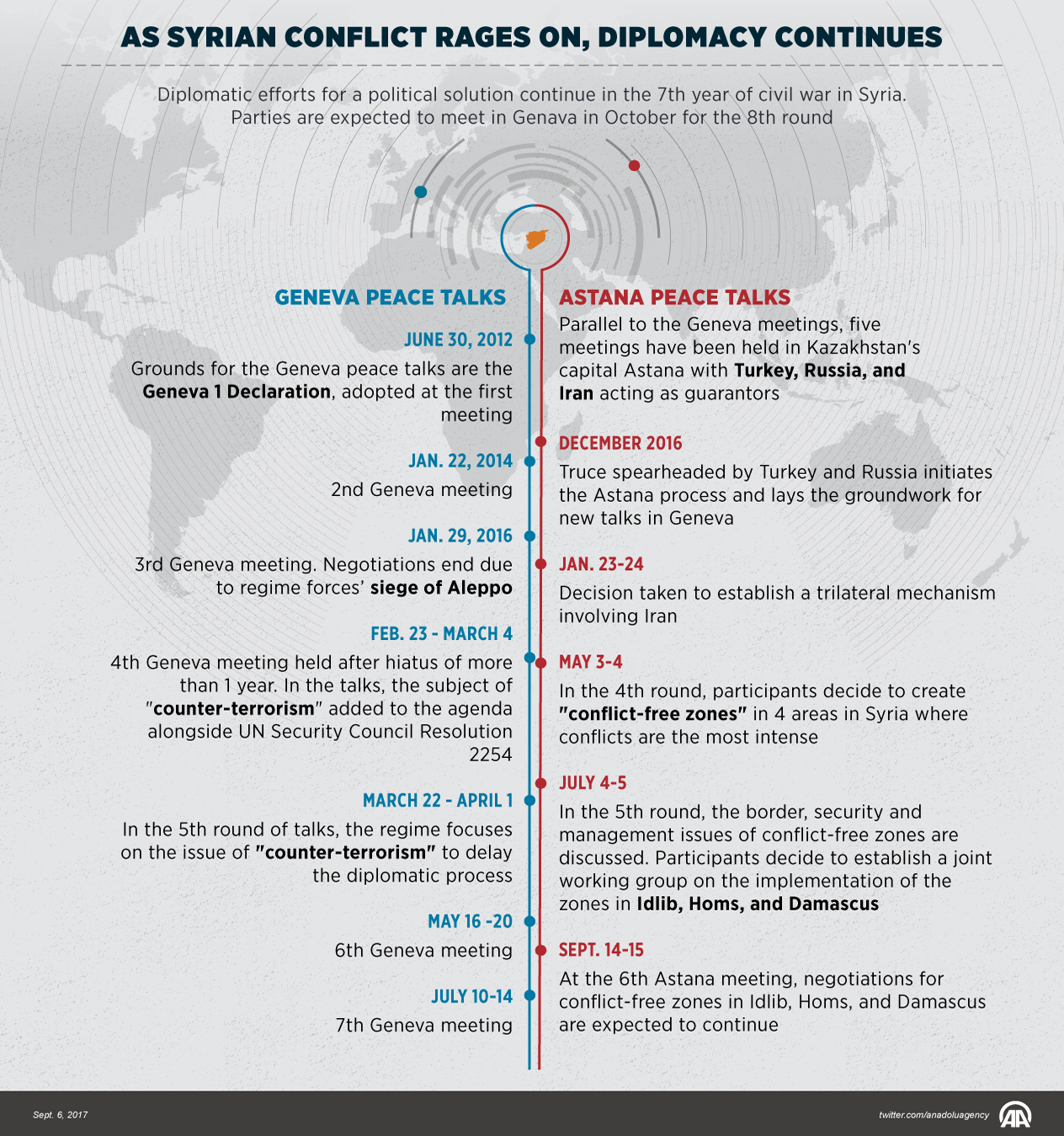 |
| [Anadulo Agency] |
The debate continues about whether the Sochi Congress is the alternative - since it has eclipsed the Geneva Process - or a step-forward in reinforcing the UN plan for Syria. Major international stakeholders, like the United States, the United Kingdom, and France, did not attend the Congress. French foreign minister Jean-Yves Le Drian dismissed the Sochi initiative, arguing that, “the resolution of the crisis will happen urgently under United Nations auspices in Geneva, France has that as an immediate objective. It’s not happening in Sochi and it must happen in Geneva.”(49) Still, Moscow maintains it wanted to give “a new impetus to the Geneva process".(50)
Aron Lund, a Syria expert and Century Foundation fellow, believes that Russia is trying to push Syria toward a diplomatic framework more in tune with military realities - both in Astana and in Sochi. "Because it makes more sense and because they obviously prefer a peace process structured around the fact that their ally is winning… For Russia, it is a way to drag Turkey and various opposition groups into a process that isn't unfavorable to their ally, Assad, which the Geneva talks are by design."(51)
However, Turkey’s Prime Minister Binali Yildirim said the so-called “Astana process” was working alongside the UN’s long-running Geneva discussions rather than competing with them. He maintained, “This process is not competing with the Geneva process. Astana peace talks, trilateral meetings, [are] not an alternative to Geneva, what we try to do is prepare infrastructure for solution[s] ... in Geneva.”(52) However, Turkey has complicated the United Nation’s handling of the Syrian conflict. It has added salt to injury by waging an open-ended war, dubbed as “Operation Olive Branch, in Afrin, northern Syria on the so-called “terrorists”, in reference to the Syrian-Kurdish People’s Protection Units (YPG). Turkish President Recep Tayyip Erdogan promised to “strangle” the force before it came into existence after securing an agreement on the military operation with Moscow.(53) The deployment of Turkish force inside Syria was a retaliation against Washington’s plans to train a 30,000-strong border force in the area since YPG men were instrumental in driving out ISIS last year.
The Afrin operation may turn into another civilian catastrophe in progress inside Syria under Turkey’s banner of ‘counterterrorism’. So far, there are reliable indicators of worsening civilian devastation as “local authorities inside Afrin are restricting civilian movement, particularly for those who want to leave the area”, and “possible attacks on hospitals and health facilities”. The United Nations also estimates that 13.1 million people are in need of protection and humanitarian assistance, including 6.1 million people who are displaced within the country.(54) This militarization of the conflict by the Turks after the Russians can be counterproductive vis-à-vis the declared diplomacy in Astana and Sochi.
Conclusion: Syria’s Gloomy Horizon
The multi-faction infighting, foreign manipulation, proxy militias, and political disarray are deteriorating in Syria. Ambassador Nicholas Burns, professor of the practice of diplomacy at Harvard University, remains pessimistic. He foresees “Syria’s brutal civil war will likely continue for months, if not years, absent a more effective international effort to stabilize the country’s borders and to produce a durable power sharing arrangement between the Assad government and its many foes, particularly in the Sunni community.”(55)
The six-year-long Geneva diplomatic process has faced major setbacks and resulted in increasing disappointment worldwide. The duality of Geneva and Sochi diplomatic initiatives is not good news. The Kremlin has sought to tilt of the center of gravity in world diplomacy from Geneva to Sochi via Astana. As Syrian political analyst Omar Kouch argues, “if the Russians are serious about supporting the Geneva track, then they would have endorsed these things in Geneva by urging the regime to engage in the negotiation process."(56) Washington has embraced some unrealistic hopes after Obama’s reluctance and Trump’s isolationism. Outgoing Secretary of State Rex Tillerson stated, “The departure of Assad through the UN-led Geneva process will create the conditions for a durable peace within Syria and security along the borders for Syria’s neighbors.”(57)
The Kremlin’s strategy has shifted into a verbal escalation against the risks of a ‘potential partition of Syria’, and Western direct intervention. Russian foreign Minister Sergey Lavrov aimed at positioning his country as the ‘moral custodian’ of Syria’s future. He stated in an interview in the Kazakh capital, Astana, where he met his Iranian and Turkish counterparts March 16, "I do not think that we should even talk about a potential partition of Syria, but it is our duty to demand that these plans be immediately foiled, some bear it… US, French, UK special forces are 'on the ground' in Syria. So it is not a 'proxy war' anymore, but direct engagement in the warfare."(58)
From a conflict mediation perspective, there is no clear evidence the Sochi process has taken off from where the Geneva process stopped; neither the Kremlin can confirm the former was in harmony with the latter. They are two competing processes with a sense of Russian diplomatic opportunism implied in Sochi. Russia’s tactics have managed to marginalize the U.S. and European visions for Syria. Eight rounds of talks in Geneva have failed in paving a path toward direct negotiations between the Assad government and the various opposition groups. Ironically, the Action Group for Syria has turned into an inactive group of diplomats struggling with the preservation of the Geneva process itself.
The multiplicity of international and regional frameworks of diplomacy and the frequency of meetings at various capitals could be counterproductive. Local stakeholders have developed distant interpretations of the support of the respective backers, and feel they are too empowered to present any desired concessions toward a compromise-based framework of resolution. Beyond the UN diplomacy, Russia, United States, France and regional powers like Turkey, Saudi Arabia, United Arab Emirates, and Iran need to convince their proxy groups with a non-zero-sum approach to negotiations. Instead, the idea of middle-way solutions and win-win scenarios can be promising, now more than ever, to move beyond the entrapment in fruitless process of talks throughout the past six years.
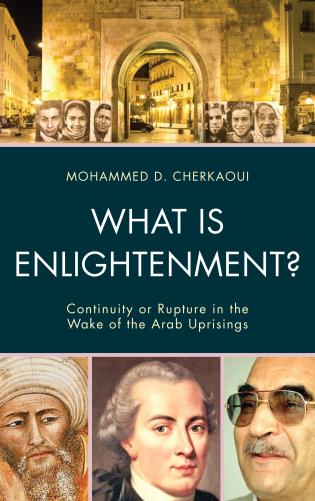
(1) Stratfor, “For Syria, No Clear View of the Future”, November 22, 2017 https://worldview.stratfor.com/article/syria-no-clear-view-future
(2) Reuters Staff, “Hezbollah: Syrian war will be over in 1-2 years”, Reuters, January 3, 2018 https://www.reuters.com/article/us-lebanon-hezbollah-syria/hezbollah-syrian-war-will-be-over-in-1-2-years-idUSKBN1ES1VX
(3) Rex W. Tillerson, “Remarks on the Way Forward for the United States Regarding Syria”, State Department, January 17, 2018 https://www.state.gov/secretary/remarks/2018/01/277493.htm
(4) Lund, Aron. “How Assad’s Enemies Gave Up on the Syrian Opposition”, The Century Foundation, October 17, 2017 https://tcf.org/content/report/assads-enemies-gave-syrian-opposition/
(5) Rifa, Interview with Mohammed Cherkaoui, January 2013 in “What is Enlightenment: Continuity or Rupture in the Wake of the Arab Uprisings”, Lexington Books, 2016
(6) UN News, “UN Security Council agrees 30-day ceasefire in Syria”, Feb. 24, 2018 https://news.un.org/en/story/2018/02/1003501
(7) Tarabay, Jamie. “Haley blames Russia for failure of Syrian ceasefire”, CNN, March 13, 2018 https://edition.cnn.com/2018/03/13/middleeast/syria-ceasefire-failure-nikki-haley-intl/index.html
(8) Specia, Magan. “UN Security Council Votes in Favor of Syria Ceasefire After Week of Bloodshed”, The New York Times, Feb. 24, 2018 https://www.nytimes.com/2018/02/24/world/middleeast/un-security-council-syria.html
(9) Borger, Julian. “UN security council votes unanimously for month-long Syria ceasefire”, the Guardian, Feb. 24, 2018 https://www.theguardian.com/world/2018/feb/24/un-security-council-votes-unanimously-syria-ceasefire
(10) Security Council, “Kuwait and Sweden: draft resolution”, S2018/146, Provisional Feb. 21, 2018
(11) Specia, Magan. “UN Security Council Votes in Favor of Syria Ceasefire After Week of Bloodshed”, The New York Times, Feb. 24, 2018 https://www.nytimes.com/2018/02/24/world/middleeast/un-security-council-syria.html
(12) Specia, Magan. “UN Security Council Votes in Favor of Syria Ceasefire After Week of Bloodshed”, The New York Times, Feb. 24, 2018 https://www.nytimes.com/2018/02/24/world/middleeast/un-security-council-syria.html
(13) Borger, Julian. “UN security council votes unanimously for month-long Syria ceasefire”, the Guardian, Feb. 24, 2018 https://www.theguardian.com/world/2018/feb/24/un-security-council-votes-unanimously-syria-ceasefire
(14) OCHA, “Syria 2018 Humanitarian Needs Overview: Millions of people face a daily struggle to survive”, November 21, 2017 http://www.unocha.org/story/syria-2018-humanitarian-needs-overview-millions-people-face-daily-struggle-survive
(15) Mohammed D. Cherkaoui, “What is Enlightenment: Continuity or Rupture in the Wake of the Arab Uprisings”, Lexington Books, 2016
(16) Martin, Chulov. “Amid the Ruins of Syria, Is Bashar Al-Assad now Facing the End? the Guardian, May 23, 2015.
(17) Ramsbotham et al. Contemporary Conflict Resolution, Polity, 2008, p. 87
(18) David Hearst, “Exclusive: The secret yacht summit that realigned the Middle East”, Middle east Eye, March 19, 2018 http://www.middleeasteye.net/news/george-nader-yacht-how-mbs-salman-red-sea-summit-mbz-sisi-plotted-qatar-turkey-jordan-saudi-gcc-arab-league-867425259
(19) David Hearst, “Exclusive: The secret yacht summit that realigned the Middle East”, Middle east Eye, March 19, 2018 http://www.middleeasteye.net/news/george-nader-yacht-how-mbs-salman-red-sea-summit-mbz-sisi-plotted-qatar-turkey-jordan-saudi-gcc-arab-league-867425259
(20) Stephen Walt, “Who’s Afraid of a Balance of Power?”, Foreign Policy December 8, 2017 http://foreignpolicy.com/2017/12/08/whos-afraid-of-a-balance-of-power/
(21) Rex W. Tillerson, “Remarks on the Way Forward for the United States Regarding Syria”, State Department, January 17, 2018 https://www.state.gov/secretary/remarks/2018/01/277493.htm
(22) Julian Borger, “UN security council votes unanimously for month-long Syria ceasefire”, The Guardian, Feb. 24, 2018 https://www.theguardian.com/world/2018/feb/24/un-security-council-votes-unanimously-syria-ceasefire
(23) Jonathan Marcus, “Russia in Syria: 'Victory' in war but can Moscow win the peace?”, BBC 27 November 2017 http://www.bbc.com/news/world-middle-east-42082615
(24) International Crisis Group, “Israel, Hizbollah and Iran: Preventing Another War in Syria”, Report 182, February 7, 2018 https://www.crisisgroup.org/middle-east-north-africa/eastern-mediterranean/syria/182-israel-hizbollah-and-iran-preventing-another-war-syria
(25) Oliver Carroll, “’Mission accomplished': Vladimir Putin meets with Bashar al-Assad to discuss end of Russia's Syria campaign”, The Independent, November 21, 2017 http://www.independent.co.uk/news/world/europe/russia-syria-military-operation-ends-vladimir-putin-bashar-al-assad-sochi-meeting-a8066581.html
(26) Oliver Carroll, “’Mission accomplished': Vladimir Putin meets with Bashar al-Assad to discuss end of Russia's Syria campaign”, The Independent, November 21, 2017 http://www.independent.co.uk/news/world/europe/russia-syria-military-operation-ends-vladimir-putin-bashar-al-assad-sochi-meeting-a8066581.html
(27) Jonathan Marcus, “Russia in Syria: 'Victory' in war but can Moscow win the peace?”, BBC 27 November 2017 http://www.bbc.com/news/world-middle-east-42082615
(28) Reuters Staff, “Putin signs Syria base deal, cementing Russia's presence there for half a century”, Reuters, July 27, 2017 https://www.reuters.com/article/us-mideast-crisis-russia-syria/putin-signs-syria-base-deal-cementing-russias-presence-there-for-half-a-century-idUSKBN1AC1R9
(29) Michael Peck, “How Russia Is Turning Syria into a Major Naval Base for Nuclear Warships (and Israel Is Worried)”, The National Interest, March 18, 2017 http://nationalinterest.org/blog/the-buzz/how-russia-turning-syria-major-naval-base-nuclear-warships-19813
(30) Oliver Carroll, “’Mission accomplished': Vladimir Putin meets with Bashar al-Assad to discuss end of Russia's Syria campaign”, The Independent, November 21, 2017 http://www.independent.co.uk/news/world/europe/russia-syria-military-operation-ends-vladimir-putin-bashar-al-assad-sochi-meeting-a8066581.html
(31) Henry Meyer and Stepan Kravchenko, “Putin Talks to Trump as Russia Sees Endgame in SyriaZ< Bloomberg, November 21, 2017 https://www.bloomberg.com/news/articles/2017-11-21/putin-to-speak-with-trump-on-syria-after-meeting-assad-in-sochi
(32) Adam Gallagher, “How will history judge Obama’s actions in Syria?” The Hill, February 21, 2017 http://thehill.com/blogs/pundits-blog/foreign-policy/320199-how-will-history-judge-obamas-actions-in-syria
(33) Barbara P. Usher, “Obama's Syria legacy: Measured diplomacy, strategic explosion,” BBC, January 13, 2017 http://www.bbc.com/news/world-us-canada-38297343
(34) Barbara P. Usher, “Obama's Syria legacy: Measured diplomacy, strategic explosion,” BBC, January 13, 2017 http://www.bbc.com/news/world-us-canada-38297343
(35) Rex W. Tillerson, “Remarks on the Way Forward for the United States Regarding Syria”, State Department, January 17, 2018 https://www.state.gov/secretary/remarks/2018/01/277493.htm
(36) Rex W. Tillerson, “Remarks on the Way Forward for the United States Regarding Syria”, State Department, January 17, 2018 https://www.state.gov/secretary/remarks/2018/01/277493.htm
(37) Action Group for Syria: A Final Communique, June 30, 2012 http://www.un.org/News/dh/infocus/Syria/FinalCommuniqueActionGroupforSyria.pdf
(38) Raymond Hinnebusch, et al. “ UN Mediation in the Syrian Crisis: From Kofi Annan to Lakhdar Brahimi”, IPI, 2016 https://www.ipinst.org/wp-content/uploads/2016/03/IPI-Rpt-Syrian-Crisis2.pdf
(39) Executive Intelligence Review, “Russia: Sochi Congress Is To Reinforce Geneva Process, Not Replace It”, January 10, 2018 https://www.larouchepub.com/pr/2018/180110_sochi_congress.html
(40) Patrick Wintour, “Russia's Syrian peace conference teeters on farce”, The Guardian January 30, 2018 https://www.theguardian.com/world/2018/jan/30/russia-syria-peace-conference-sochi-foreign-minister
(41) Patrick Wintour, “Russia's Syrian peace conference teeters on farce”, The Guardian January 30, 2018 https://www.theguardian.com/world/2018/jan/30/russia-syria-peace-conference-sochi-foreign-minister
(42) Patrick Wintour, “UN envoy to attend Syria peace talks despite boycott”, The Guardian, January 28, 2018 https://www.theguardian.com/world/2018/jan/28/un-envoy-attend-russia-backed-syria-peace-talks-sochi-despite-opposition-boycott
(43) Patrick Wintour, “Russia-backed Syrian peace talks agree deal on new constitution”, The Guardian, January 31, 2018 https://www.theguardian.com/world/2018/jan/31/russia-backed-syrian-peace-talks-deal-constitution-un
(44) UN Information Centre, “Syria: UN-supported talks in Geneva extended until mid-December”, November 30, 2017 http://www.un.org/apps/news/story.asp?NewsID=58199#.WieaB-WGOUk
(45) Aljazeera, “Russia, Iran and Turkey agree to hold 'Syrian congress'”, 23 Nov 2017 http://www.aljazeera.com/news/2017/11/russia-iran-turkey-agree-hold-syrian-congress-171122200119595.html
(46) Aljazeera, “Russia, Iran and Turkey agree to hold 'Syrian congress'”, 23 Nov 2017 http://www.aljazeera.com/news/2017/11/russia-iran-turkey-agree-hold-syrian-congress-171122200119595.html
(47) Aldroubi, Mina. “Sochi meeting struggles to find peace for Syria”, The National, January 30, 2018 https://www.thenational.ae/world/mena/sochi-meeting-struggles-to-find-peace-for-syria-1.700374
(48) Oliver Carroll, “’Mission accomplished': Vladimir Putin meets with Bashar al-Assad to discuss end of Russia's Syria campaign”, The Independent, November 21, 2017 http://www.independent.co.uk/news/world/europe/russia-syria-military-operation-ends-vladimir-putin-bashar-al-assad-sochi-meeting-a8066581.html
(49) Patrick Wintour, “Russia's Syrian peace conference teeters on farce”, The Guardian January 30, 2018 https://www.theguardian.com/world/2018/jan/30/russia-syria-peace-conference-sochi-foreign-minister
(50) TASS, “Syrian Congress in Sochi will give impetus to Geneva process - Russian Ambassador to UN”, Feb. 3, 2018 http://tass.com/politics/988370
(51) Najjar, Farah. “Syria talks: Could Sochi bring peace via new track?”, Aljazeera, January 29, 2018 https://www.aljazeera.com/news/2018/01/syria-talks-sochi-bring-peace-track-180129065040073.html
(52) AFP, “Astana and Geneva talks not competing, Turkey says”, Gulf News, Nov. 28. 2017 http://gulfnews.com/news/mena/syria/astana-and-geneva-talks-not-competing-turkey-says-1.2131796
(53) Reuters Staff, “Turkey's military operation against Kurdish YPG in Afrin”, Reuters, January 25, 2018 https://www.reuters.com/article/us-mideast-crisis-syria-turkey-explainer/turkeys-military-operation-against-kurdish-ypg-in-afrin-idUSKBN1FE2E9
(54) UN News, “Daily Press Briefing by the Office of the Spokesperson for the Secretary-General”, January 30, 2018 https://www.un.org/press/en/2018/db180130.doc.htm
(55) Burns. Nicholas. “The Future of Politics”, Research Institute, 2018 Davos Edition, p. 48
(56) Najjar, Farah. “Syria talks: Could Sochi bring peace via new track?”, Aljazeera, January 29, 2018 https://www.aljazeera.com/news/2018/01/syria-talks-sochi-bring-peace-track-180129065040073.html
(57) Rex W. Tillerson, “Remarks on the Way Forward for the United States Regarding Syria”, State Department, January 17, 2018 https://www.state.gov/secretary/remarks/2018/01/277493.htm
(58) Aljazeera News, “Lavrov: Syria's partition must stop”, March 16, 2018 https://www.aljazeera.com/news/2018/03/lavrov-syria-partition-stop-180317145012506.html
